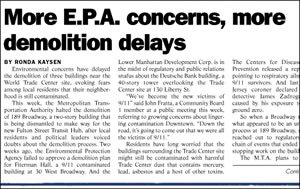Last week’s article entitled “Rally around the country for Zadroga legislation,” by John Bayles, described the efforts of a city council member in Los Angeles to support the 9/11 James Zadroga Health and Compensation Act. The bill, which was defeated in the U.S. House of Representatives last July, aims to expand federal funding for people who developed health problems as a result of the events of 9/11. It was named for James Zadroga, a New York City Police Detective and a 9/11 first responder. The issue also featured an opinion piece by Senator Kristen Gillibrand, “Helping our 9/11 heroes,” in which she pledged to work for passage of the bill.
Zadroga’s death was first reported in Downtown Express in a 2006 article that discussed the lingering effects of the attacks. A New Jersey coroner had just found that Zadroga died as a result of exposure to toxins at the World Trade Center. “More E.P.A. concerns, more demolition delays,” by Ronda Kaysen, outlines the concerns of residents near the World Trade Center site after demolition was halted on three buildings. The buildings included 189 Broadway, which was being demolished to provide space for the Fulton Street Transit Hub; Fiterman Hall, a dormitory for the Borough of Manhattan Community College; and the Deutsche Bank building located at 130 Liberty Street. Kaysen quoted a local resident named John Fratta, who spoke at a public meeting to address contamination in the area: “Down the road, it’s going to come out that we were all the victims of 9/11.”
While residents remained fearful of the environmental contaminants in the buildings slated for demolition, they were also upset at what they perceived as a lack of oversight of the projects. Community Board 1 passed a resolution criticizing the Lower Manhattan Development Corporation for its management of the demolitions. And Catherine McVay Hughes, the chair of C.B.1’s World Trade Center Redevelopment Committee, was quoted as saying, “The onus of these demolitions on weekends really should have the oversight of the Lower Manhattan Construction Command Center, and I’m surprised that it fell through the cracks.” Yet four-and-a-half years after the attacks, residents were also weary of the continued setbacks. Referring to Deutsche Bank and Fiterman, Hughes said, “I’m surprised that we’re approaching the five-year anniversary [of 9/11] and we still have two large toxic buildings that have to be taken down.”
— compiled by Andrea Riquier



























